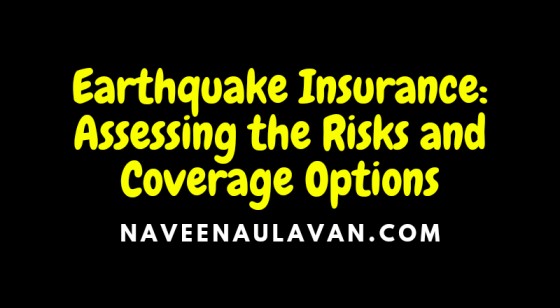Earthquakes are natural disasters that can cause significant damage to property and infrastructure. The financial implications of an earthquake can be devastating, leading to substantial repair and rebuilding costs. To mitigate these risks, individuals and businesses have the option to purchase earthquake insurance. In this article, we will explore the risks associated with earthquakes, the importance of earthquake insurance, and the various coverage options available.
Understanding Earthquakes
What Causes Earthquakes?
Earthquakes are the result of the sudden release of energy in the Earth’s crust. The primary cause of earthquakes is the movement of tectonic plates, which are large sections of the Earth’s crust that float on the semi-fluid mantle below. When these plates collide, slide past each other, or separate, it can lead to seismic activity.
Measuring Earthquakes: The Richter Scale
The magnitude of an earthquake is measured using the Richter scale, which quantifies the amount of energy released during an earthquake. The scale ranges from 1 to 10, with each whole number increase representing a tenfold increase in the earthquake’s magnitude.
The Risks Associated with Earthquakes
Physical Damage to Property
Earthquakes can cause severe physical damage to buildings, infrastructure, and personal belongings. The shaking and ground motion can lead to structural collapses, foundation failures, and damage to utilities such as water and gas lines. The extent of the damage depends on various factors, including the magnitude of the earthquake, the distance from the epicenter, and the quality of construction.
Business Interruption
In addition to physical damage, earthquakes can disrupt business operations, leading to significant financial losses. Companies may need to temporarily close their doors to assess and repair damage, resulting in lost revenue, additional expenses, and potential layoffs. Business interruption coverage can help mitigate these financial losses.
Secondary Hazards
Earthquakes can also trigger secondary hazards such as landslides, tsunamis, and aftershocks. These events can cause further destruction and complicate the recovery process. It is crucial to consider these potential risks when evaluating the need for earthquake insurance.
The Importance of Earthquake Insurance
Homeowners’ Insurance vs. Earthquake Insurance
Standard homeowners’ insurance policies typically do not cover earthquake damage. While they may provide coverage for other perils like fire and theft, earthquakes are often excluded. To protect their investment, homeowners need to purchase a separate earthquake insurance policy or add an earthquake endorsement to their existing coverage.
Assessing the Risks and Vulnerability
Before deciding on earthquake insurance, individuals should evaluate their risk and vulnerability to earthquakes. Factors such as geographical location, proximity to fault lines, and building type should be considered. High-risk areas, such as regions along the Pacific Ring of Fire, are more prone to earthquakes and may require higher coverage limits.
Financial Protection and Peace of Mind
Earthquake insurance offers financial protection and peace of mind in the face of a potentially catastrophic event. It ensures that individuals and businesses have the necessary funds to rebuild, repair, and replace damaged property. Without insurance, the financial burden can be overwhelming and may even lead to bankruptcy or foreclosure.
Coverage Options for Earthquake Insurance
Dwelling Coverage
Dwelling coverage provides protection for the structure of the insured property, including the foundation, walls, roof, and attached structures like garages. It typically includes coverage for damages caused by shaking, ground displacement, and other earthquake-related perils.
Personal Property Coverage
Personal property coverage compensates for the loss or damage of personal belongings, such as furniture, appliances, electronics, and clothing. It is essential to review policy limits and ensure that they are sufficient to cover the full value of personal possessions.
Loss of Use Coverage
Loss of use coverage, also known as additional living expenses coverage, reimburses policyholders for additional living expenses incurred when their homes become uninhabitable due to earthquake damage. This coverage can help cover the costs of temporary accommodation, meals, and other necessary expenses during the rebuilding process.
Business Interruption Coverage
For businesses, earthquake insurance may include business interruption coverage. This coverage compensates for lost income and extra expenses incurred due to a temporary closure or disruption in operations caused by an earthquake.
Considerations When Purchasing Earthquake Insurance
Policy Deductibles
Earthquake insurance policies typically have a deductible, which is the amount the policyholder must pay out of pocket before the insurance coverage kicks in. It is essential to understand the deductible amount and consider whether it is affordable in the event of a claim.
Policy Exclusions and Limitations
Policyholders should carefully review the policy exclusions and limitations of earthquake insurance. Some policies may have restrictions on coverage for certain types of buildings, pre-existing damage, or certain perils like landslides. Understanding these limitations is crucial to avoid surprises during the claims process.
Conclusion
Earthquakes pose significant risks to property owners and businesses, both in terms of physical damage and financial losses. Earthquake insurance provides essential coverage to mitigate these risks and ensure a smooth recovery process. By understanding the risks associated with earthquakes, evaluating individual vulnerability, and exploring coverage options, individuals and businesses can make informed decisions to protect their assets and secure their financial future. Remember, investing in earthquake insurance is an investment in peace of mind and resilience.
